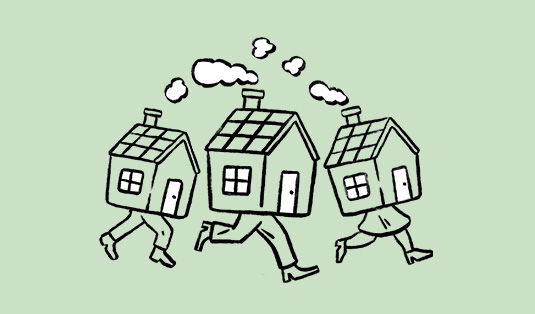Freehold vs Leasehold
December 02nd, 2022

In essence, there are two main types of legal property ownership in the UK: freehold and leasehold. But, what is the difference between freehold and leasehold, and does this difference really matter?
Though most estate agents tend to gloss over the differences between freehold and leasehold properties, the short answer is yes, they do matter. Understanding the difference between these two types of property ownership is essential, and can “be the difference between a home that is worth buying and one that isn’t”. This is because whether a property is freehold or leasehold affects an owner's ability to buy, own and sell their home.
What is Freehold?
A ‘freeholder’ owns a property, and the land it is built on outright, indefinitely. In theory, freeholders can do anything they like with their property and their land (though there are some limitations to this in practice).
Advantages
In general, freehold is a preferred form of ownership and there are really no drawbacks to owning a property in this way. The main advantages of freehold ownership include:
- You can make alterations to your property (subject to planning permission)
- Do not have to worry about leases running out, or being charged to renew/extend a lease
- Do not have to pay ground rent or service charges
Disadvantages
However, it is important to note that in the case of freehold, you are responsible for:
- Organising and financing your own maintenance work
- If major maintenance/building issues arise this can be extremely costly
- Insuring the building and the contents
What Does It Mean If A Property is Leasehold?
A ‘leaseholder’ leases a property from the owner for a specific length of time. As explained by the Law Society, “A lease is an agreement between you and the owner. That person or company is the freeholder or the landlord. The lease sets out what you can and cannot do as a leaseholder.”
You Don’t Own The Building or Land Unlike with freehold properties, with leasehold you do not own the land it sits on. Most flats are owned leasehold. In these cases, you do not own any of the common areas (e.g. hallways, stairs, lifts etc.) or a stake in the building your property is in.
The duration of the lease can be for whatever term is agreed between the freeholder and the leaseholder. The leases are usually long-term - often 99 or 125 years - however, they can be as short or long as 40 and 999 years. When a lease expires, the leaseholder's exclusive ownership will end and revert back to the freeholder (unless a lease has been extended).
When a leasehold property is sold, the lease is passed on with it, so the length decreases.
Disadvantages
Ground Rents Many leases require the leaseholder to pay ‘ground rent’ to the landlord. Historically, ground rents were often fixed and marginal (usually less than £100 a year). In recent years however, leaseholders have reported high annual ground rents, frequently in excess of £250. Similarly, in some cases leaseholders have found that the ground rent doubles every several years, which can result in leaseholders incurring rapidly increasing, extortionate costs.
For example, say you are looking to buy a property where the lease stipulates that the ground rent will double every 10 years. If you bought this property in 2021, with an initial ground rent of £250 per year, by 2061, you would be paying £4,000 in per year in ground rent.
According to MoneySavingExpert, “some leaseholders have found that the ground rent is so expensive that it’s made remortgaging or selling their property nearly impossible”. This is because mortgage providers and buyers often don’t want to take on this kind of financial burden.
Service Charges Unlike with freehold properties, leaseholders are not usually responsible for building maintenance and building upkeep. It is the responsibility of the freeholders to organize this. However, leaseholders are often required to contribute to these costs by paying what is known as a ‘service charge’ to the freeholder.
What is a Service Charge? A service charge is usually an annual charge levied which covers things like maintaining and cleaning communal areas; communal area electricity bills; building repair and maintenance etc. This charge varies from property to property and depending on the size of the building. If you are looking to buy a leasehold property it is important to factor service charge costs into any decisions.
Always Check What the Service Charge is Service charges are usually written into the terms of a lease. Therefore, it is important to check whether there is a cap on what can be charged. Otherwise you might be faced with rapidly increasing service charges. Extortionate and rapidly growing service charges have become an increasing problem in recent years, with leaseholders in some cases being billed upwards of £1,000 for service charges.
Leasehold Lifespans It’s imperative to consider the lease length when looking to buy or sell a leasehold property. Whilst the value of long leases remains fairly stable, the value of a short lease can decrease very rapidly. According to HomeOwners Alliance, “a flat with a lease of 60 years is worth more than 10 per cent less than if it had a lease of 99 years. You might think a flat is worth £200,000, but actually it is worth less than £180,000.”
Avoid Leases Less than 80 Years The general rule is to “steer clear of leases around 80 years” or less. Properties with leases under 80 years can be very difficult to sell or re-mortgage. For buyers, some lenders may be unwilling to give you a mortgage on properties with shorter leases.
Though short leases can be worrying, it is important to note that there are very few risks associated with longer leases. According to Unbiased, “a 999 year lease is effectively as good as freehold.”
Extending Leases Whilst it is possible to extend leases, this can be a very difficult and expensive process. In general, “the cost of extending a lease rockets once a lease drops below 80 years in length. The difference between extending a lease 85 years in length and one 79 years in length can be in excess of £8,000. While it can cost near £30,000 to extend a lease that has only 60 years on it.”
You can find more information on the process of extending a lease here: Extend Your Lease.
Leasehold Restrictions Leaseholders are often subject to restrictions imposed on them by the freeholders. If you are looking to purchase a property, it is important to be aware of all restrictive covenants contained within your lease. To name a few examples:
- Some leases prohibit pets
- Some leases prohibit subletting
- Some leases place restrictions on the kind of renovations that can be done within the property e.g. prohibitions on removing carpet. In any case, leaseholders will have to seek permission from freeholders for any intended major works
Advantages of Leasehold Properties Whilst leasehold properties can be more complicated and sometimes worrying investments, there can be some advantages to buying and owning leasehold properties over freehold:
- Leasehold properties are usually cheaper due to the risks involved
- Leaseholders are not usually responsible for organizing maintenance, upkeep and repairs in communal areas - this is usually the responsibility of the freeholder
- Leaseholders are not responsible for maintaining the structure and exterior of buildings - this is the responsibility of the freeholder
- The freeholder is responsible for arranging building insurance
What to do about unfair leases? If you are having problems with unfair lease terms or extortionate ground rent and service charges, it is important to remember and be aware of your rights as a leaseholder. here are avenues for rectification and complaints. You can find out more information about this here: Management Disputes.
Controversy over Leasehold In recent years, however, unfair and onerous lease terms have come under fire. According to the 2019 annual Homeowner Survey, “one in four (26%) leaseholders feel their freeholder is over charging, but don’t feel able to do much about it”. “23% of leaseholders feel they lack control over what major works are done and (18%) say they have difficulty getting necessary works done.”
The Future
The government has thus faced increasing pressure to tackle some of the common issues associated with leasehold properties discussed above. As such, “a new ground rent bill is set to enter force on 30 June, which’ll ban ground rents on new leases and lease extensions indefinitely.”
In addition, “The Government has also laid out other proposals to make it easier and cheaper to extend an existing lease. As well as simplifying the process of buying a property’s freehold.” Unfortunately, it is not yet clear when this separate bill might be introduced as these proposals are some way behind the ground rent bill.
Related articles:
Leasehold vs. Freehold: the difference?
Leasehold vs. Freehold: what’s the difference?
Freehold, leasehold and commonhold
By Imogen Bahl
Want to
Stay in Touch?
Sign Up to our Newsletter

Emma's Estate Agents is a trading name of Emma’s Estate Agents Ltd. Est. 1995 (©) 2022. VAT No: 248 9798 28. All Rights Reserved. Ombudsman Membership Number: T06664


